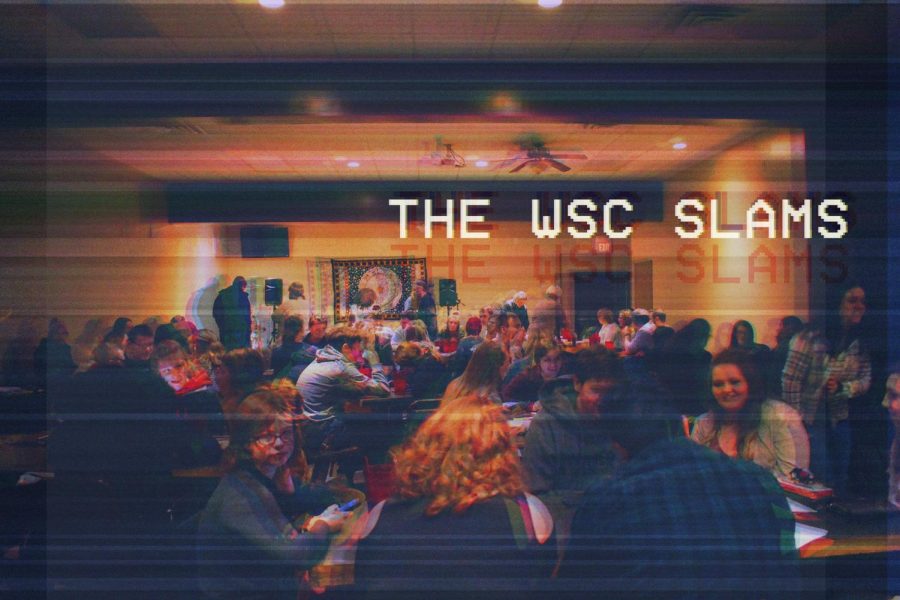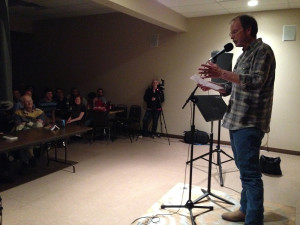About the WSC Slams

The Poetry Slam is a biannual poetry competition held to showcase individuals’ poetic creativity in a competitive format. In the fall of 2018, Wayne State College celebrated its 40th consecutive poetry slam, making it the longest-running poetry slam in Nebraska.
The Fiction Slam is also a biannual competition with an emphasis on short stories and flash fiction.
The Lucky 13 Fiction Slam (now “The Fiction Slam”) was a biannual event that highlighted writing specific to short storytelling. Entrants participated in a preliminary round from which the thirteen highest-scoring competitors were chosen.
The Slams are held at The Max Bar & Grill in downtown Wayne, Nebraska. Follow us on Facebook to find out more information on upcoming slams and to see pictures of the winners!
“Downtown Slam”
By JV Brummels
When Lisa Sandlin came north from Santa Fe to join the English Department at Wayne State College, she brought with her the idea for a slam. She’d attended one, or knew someone who’d attended one, or had read a newspaper article about one—I don’t precisely recall—and that was enough to get us both excited. It seemed like something we ought to try.
For a while our slams were low-key, in-house affairs. In the fall semester, Lisa and I would each teach a beginning poetry workshop. During finals week, we’d take an evening, meet in the Humanities Building lounge, and these two sections would face off. Usually, members of the upper-level workshop would judge. We’d make quite a fuss over the competitive nature of the slam; for weeks before the slam, students from opposing workshops would eye each other suspiciously in the halls. I would assure my students that they clearly had the advantage—I had read their poems and knew them to be excellent. Meanwhile, Lisa—from what our spies told us—would spend her workshops honing her students’ delivery and, I suspect, doing some fashion makeovers. (I can’t prove Lisa encouraged it as a way of gaining points from the male judges, but her female students tended to show up in hose and heels, or with bare midriffs; they also seemed to smile a lot and even occasionally wink.)
Only Lisa and I knew the competition was a sham. After a great show of gathering score sheets, tallying points and comparing notes, we would stand together and announce that “the winner is poetry!” That phrase was Lisa’s idea, too. I’m not sure why we didn’t play it as a straight competition. I suppose we had some notion that poetry shouldn’t be competitive. I know several poets who still “don’t believe in slams,” despite their obvious popularity. Maybe it was just too much fun to say the truth, that poetry was the winner.
In most ways these “slams” weren’t much different than the public readings many workshop teachers host for their students. I had done that for years. But a significant difference became obvious: the quality of the performances. Not only did these young poets slam with a kind of fire I had never heard in workshop readings, the performances gained dramatic power as the evening went on. Clearly, competition added an edge to the work, and, even more obviously, poets fed off each other, determined to outperform the poets who’d read before them. The result was an evening of poetry that built as it went on.
At this writing, Slam XIII is about a month away. Wayne State hosts two slams a year, one each semester. My shaky calculations suggest, then, that the first downtown slam was in the spring of 1999, a fitting end to the old millennium and a nice kickoff to the new.
I suppose everyone involved was a little nervous about the first slam. Poets had read in bars before, of course, but these slammers would be mostly undergraduate English majors who tended to be more comfortable alone with a book than on a stage in front of an audience that was sure to contain at least a few drunks. The weather was cold and rainy. Lisa and I worked out a set of rules based on how we thought slams were run. (To this day, Wayne rules remain a little different from other slams.) Our secret weapon was Eddie Elfers, a seasoned performer who had agreed to emcee the evening. (Eddie has hosted almost all of the subsequent slams; his good humor and ability to keep things moving along have contributed much to their success.)
That first slam was more successful than I could have imagined—packed house (including a good number of drunks), an awful lot of good poems and performances, close judging and a suspenseful finale. The downtown slams continue to be the highlights of the year for me.
Though lots of folks from out of town have competed and sometimes won, the core competitors continue to be Wayne State undergraduates. I’ve seen them hold their own against some very seasoned slammers, and that is an invaluable part of a literary education these days. What was, and continues to be, best in the slams are the surprises, when very young poets I’ve known only in a workshop appear to visibly grow in the spotlight, finding their voice to speak their piece to an attentive crowd. That moment, when an unprepossessing student morphs into a poet capable of dictating when the audience breathes, is magical.
And magic is what poetry is about. Magic can and does happen on the page, but the connection slams allow between poet and audience is both larger and more personal than the printed word. And it’s reassuring, in a new century and millennium, to see that most ancient of the literary arts—poetry—return to its oral roots. When it comes to slams, Lisa has always been right: Poetry is the winner.



